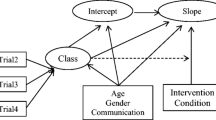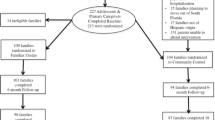Abstract
Family-based preventive interventions have been found to prevent youth internalizing symptoms, yet they operate through diverse mechanisms with heterogeneous effects for different youth. To better target preventive interventions, this study examines the effects of the Familias Unidas preventive intervention on reducing internalizing symptoms with a universal sample of Hispanic youth in a real-world school setting (i.e., effectiveness trial). The study utilizes emerging methods in baseline target moderated mediation (BTMM) to determine whether the intervention reduces internalizing symptoms through its impact on three distinct mechanisms: family functioning, parent stress, and social support for parents. Data are from a randomized controlled effectiveness trial of 746 Hispanic eighth graders and their parents assessed at baseline, 6-, 18-, and 30-month post-baseline. BTMM models examined three moderated mechanisms through which the intervention might influence 30-month adolescent internalizing symptoms. The intervention decreased youth internalizing symptoms through improvements in family functioning in some models, but there was no evidence of moderation by baseline level of family functioning. There was some evidence of mediation through increasing social support for parents for those intervention parents presenting with lower baseline support. However, there was no evidence of mediation through parent stress. Post hoc analyses suggest a possible cascading of effects where improvements in support for parents strengthened parental monitoring of youth and ultimately reduced youth internalizing symptoms. Findings support the intervention’s effects on internalizing symptoms in a universal, real-world setting, and the value of BTMM methods to improve the targeting of preventive interventions. ClinicalTrials.gov Identifier: NCTO1038206, First Posted: December 23, 2009.


Similar content being viewed by others
References
Achenbach, T. M. C. (1991). Manual for the youth self-report and 1991 profile. University of Vermont.
Anderson, E. R., & Mayes, L. C. (2010). Race/ethnicity and internalizing disorders in youth: A review. Clinical Psychology Review, 30, 338–348. https://doi.org/10.1016/j.cpr.2009.12.008
August, G. J., & Gewirtz, A. (2019). Moving toward a precision-based, personalized framework for prevention science: Introduction to the special issue. Prevention Science, 20, 1–9.
Ayón, C. (2011). Latino families and the public child welfare system: Examining the role of social support networks. Children and Youth Services Review, 33, 2061–2066. https://doi.org/10.1016/j.childyouth.2011.05.035
Bertha, E. A., & Balasz, J. (2013). Subthreshold depression in adolescence: A systematic review. European Child & Adolescent Psychiatry, 22, 589–603.
Byrnes, H. F., & Miller, B. A. (2012). The relationship between neighborhood characteristics and effective parenting behaviors: The role of social support. Journal of Family Issues, 33, 1658–1687. https://doi.org/10.1177/0192513X12437693
Cervantes, R. C., Padilla, A. M., & Salgado de Snyder, N. (1991). The Hispanic Stress Inventory: A culturally relevant approach to psychosocial assessment. Psychological Assessment: A Journal of Consulting and Clinical Psychology, 3, 438–447. https://doi.org/10.1037/1040-3590.3.3.438
Costello, E. J., Mustillo, S., Erkanli, A., Keeler, G., & Angold, A. (2003). Prevalence and development of psychiatric disorders in childhood and adolescence. Archives of general psychiatry, 60, 837-844.
de Groot, A., Koot, H., & Verhulst, F. (1996). Cross-cultural generalizability of the youth self-report and teacher’s report form cross-informant syndromes. Journal of Abnormal Child Psychology, 24, 651–664. https://doi.org/10.1007/BF01670105
DeVore, E. R., & Ginsburg, K. R. (2005). The protective effects of good parenting on adolescents. Current Opinion in Pediatrics, 17, 460–465.
Estrada, Y., Lee, T. K., Huang, S., Tapia, M. I., Velázquez, M. R., Martinez, M. J., Pantin, H., Ocasio, M. A., Vidot, D. C., Molleda, L., Villamar, J., Stepanenko, B. A., Brown, C. H., & Prado, G. (2017). Parent-centered prevention of risky behaviors among Hispanic youths in Florida. American Journal of Public Health, 107, 607. https://doi.org/10.2105/AJPH.2017.303653
Garthe, R., Sullivan, T., & Kliewer, W. (2015). Longitudinal relations between adolescent and parental behaviors, parental knowledge, and internalizing behaviors among urban adolescents. Journal of Youth and Adolescence, 44, 819–832. https://doi.org/10.1007/s10964-014-0112-0
Gartlehner, G., Hansen, R. A., Nissman, D., Lohr, K. N., & Carey, T. S. (2006). A simple and valid tool distinguished efficacy from effectiveness studies. Journal of Clinical Epidemiology, 59, 1040–1048. https://doi.org/10.1016/j.jclinepi.2006.01.011
Ge, X., Lorenz, F. O., Conger, R. D., Elder, G. H., & Simons, R. L. (1994). Trajectories of stressful life events and depressive symptoms during adolescence. Developmental Psychology, 30, 467–483. https://doi.org/10.1037/0012-1649.30.4.467
Gorman-Smith, D., Tolan, P. H., Zelli, A., & Huesmann, L. R. (1996). The relation of family functioning to violence among inner-city minority youths. Journal of Family Psychology, 10, 115–129. https://doi.org/10.1037/0893-3200.10.2.115
Hamza, C., & Willoughby, T. (2011). Perceived parental monitoring, adolescent disclosure, and adolescent depressive symptoms: A longitudinal examination. Journal of Youth and Adolescence, 40, 902–915. https://doi.org/10.1007/s10964-010-9604-8
Howe, G. W. (2019). Using baseline target moderation to guide decisions on adapting prevention programs. Development and Psychopathology, 31, 1777–1788. https://doi.org/10.1017/S0954579419001044
Howe, G. W., Beach, S. R. H., Brody, G. H., & Wyman, P. A. (2016). Translating genetic research into preventive intervention: The baseline target moderated mediator design. Frontiers in Psychology, 6, 1911–1911. https://doi.org/10.3389/fpsyg.2015.01911
Hu, L., & Bentler, P. M. (1999). Cutoff criteria for fit indexes in covariance structure analysis: Conventional criteria versus new alternatives. Structural Equation Modeling: A Multidisciplinary Journal, 6, 1–55. https://doi.org/10.1080/10705519909540118
Huang, C., Costeines, J., Kaufman, J., & Ayala, C. (2014). Parenting stress, social support, and depression for ethnic minority adolescent mothers: Impact on child development. Journal of Child and Family Studies, 23, 255–262. https://doi.org/10.1007/s10826-013-9807-1
Kerr, M., & Stattin, H. (2000). What parents know, how they know it, and several forms of adolescent adjustment: Further support for a reinterpretation of monitoring. Developmental Psychology, 36, 366–380. https://doi.org/10.1037/0012-1649.36.3.366
Lei, H., Nahum-Shani, I., Lynch, K., Oslin, D., & Murphy, S. A. (2012). A “SMART” design for building individualized treatment sequences. Annual Review of Clinical Psychology, 8, 14-28.
Lippold, M. A., Glatz, T., Fosco, G. M., & Feinberg, M. E. (2018). Parental perceived control and social support: Linkages to change in parenting behaviors during early adolescence. Family Process, 57, 432–447. https://doi.org/10.1111/famp.12283
MacKinnon, D. P., Lockwood, C. M., Hoffman, J. M., West, S. G., & Sheets, V. (2002). A comparison of methods to test mediation and other intervening variable effects. Psychological methods, 7, 83–104.
MacKinnon, D. P., Valente, M. J., & Gonzalez, O. (2020). The correspondence between causal and traditional mediation analysis: The link is the mediator by treatment interaction. Prevention Science, 21, 147–157.
Muthén, L. K., & Muthén, B. O. (1998–2017). Mplus user’s guide. In (Eighth Edition ed.). Los Angeles, CA: Muthén & Muthén.
National Academies of Sciences, Engineering, and Medicine. (2019). Fostering healthy mental, emotional, and behavioral development in children and youth: A national agenda. Washington, DC: The National Academies Press. https://doi.org/10.17226/25201
Pantin, H. (1996). Ecodevelopmental measures of support and conflict for Hispanic youth and families. University of Miami School of Medicine.
Perrino, T., Brincks, A., Howe, G., Brown, C., Prado, G., & Pantin, H. (2016a). Reducing internalizing symptoms among high-risk, Hispanic adolescents: Mediators of a preventive family intervention. Prevention Science, 17, 595–605. https://doi.org/10.1007/s11121-016-0655-2
Perrino, T., Pantin, H., Huang, S., Brincks, A., Brown, C. H., & Prado, G. (2016b). Reducing the risk of internalizing symptoms among high-risk Hispanic youth through a family intervention: A randomized controlled trial. Family Process, 2016, 91–106.
Perrino, T., Pantin, H., Prado, G., Huang, S., Brincks, A., Howe, G., Beardslee, W., Sandler, I., & Brown, C. (2014). Preventing internalizing symptoms among Hispanic adolescents: A synthesis across Familias Unidas trials. Prevention Science, 15, 917–928. https://doi.org/10.1007/s11121-013-0448-9
Preacher, K. J., Curran, P. J., & Bauer, D. J. (2006). Computational tools for probing interactions in multiple linear regression, multilevel modeling, and latent curve analysis. Journal of educational and behavioral statistics, 31, 437–448.
Prado, G., Cordova, D., Huang, S., Estrada, Y., Rosen, A., Bacio, G. A., Leon Jimenez, G., Pantin, H., Brown, C. H., Velazquez, M. R., Villamar, J., Freitas, D., Tapia, M. I., & McCollister, K. (2012). The efficacy of Familias Unidas on drug and alcohol outcomes for Hispanic delinquent youth: Main effects and interaction effects by parental stress and social support [Supplement]. Drug and Alcohol Dependence, 125, S18–S25. https://doi.org/10.1016/j.drugalcdep.2012.06.011
Prado, G., & Pantin, H. (2011). Reducing substance use and HIV health disparities among Hispanic youth in the USA: The Familias Unidas program of research. Psychosocial Intervention, 20, 63–73. https://doi.org/10.5093/in2011v20n1a6
Prado, G., Pantin, H., Briones, E., Schwartz S. J., Feaster D., Huang, S., Sullivan, S., Tapia, M. I., Sabillon, E., Lopez, B., Szapocznik, J. A. (2007). A randomized controlled trial of a parentcentered intervention in preventing substance use and HIV risk behaviors in Hispanic adolescents. Journal of consulting and clinical psychology, 75, 914.
Restifo, K., & Bögels, S. (2009). Family processes in the development of youth depression: Translating the evidence to treatment. Clinical Psychology Review, 29, 294–316. https://doi.org/10.1016/j.cpr.2009.02.005
Russell, D., Cutrona, C. E., Rose, J., & Yurko, K. (1984). Social and emotional loneliness: An examination of Weiss’s typology of loneliness. Journal of Personality and Social Psychology, 46, 1313–1321. https://doi.org/10.1037/0022-3514.46.6.1313
Szapocznik, J., & Coatsworth, J. D. (1999). An ecodevelopmental framework for organizing the influences on drug abuse: A developmental model of risk and protection. In M. D. Glantz & C. R. Hartel (Eds.), Drug Abuse: Origins & Interventions. (pp. 331–336).
Sheeber, L. B., Davis, B., Leve, C., Hops, H., & Tildesley, E. (2007). Adolescents’ relationships with their mothers and fathers: Associations with depressive disorder and subdiagnostic symptomatology. Journal of Abnormal Psychology, 116, 144–154. https://doi.org/10.1037/0021-843X.116.1.144
Tolan, P. H., Gorman-Smith, D., Huesman, L. R., & Zelli, A. (1997). Assessment of family relationship characteristics: A measure to explain risk for antisocial behavior and depression among urban youth. Psychological Assessment, 9, 212–223. https://doi.org/10.1037/1040-3590.9.3.212
Yap, M. B. H., & Jorm, A. F. (2015). Parental factors associated with childhood anxiety, depression, and internalizing problems: A systematic review and meta-analysis. Journal of Affective Disorders, 175, 424–440. https://doi.org/10.1016/j.jad.2015.01.050
Yap, M. B., Morgan, A. J., Cairns, K., Jorm, A. F., Hetrick, S. E., & Merry, S. (2016). Parents in prevention: A meta-analysis of randomized controlled trials of parenting interventions to prevent internalizing problems in children from birth to age 18. Clinical Psychology Review, 50, 138–158.
Yoshikawa, H., Aber, J. L., & Beardslee, W. R. (2012). The effects of poverty on the mental, emotional, and behavioral health of children and youth. American Psychologist, 67, 272–284. https://doi.org/10.1037/a0028015
Funding
This work was supported by National Institute on Drug Abuse (NIDA) grant # K01 DA046516 (Ahnalee Brincks, Principal Investigator) and grant # R01 DA025192 (Guillermo Prado, Principal Investigator).
Author information
Authors and Affiliations
Corresponding author
Ethics declarations
Ethics Approval
This study represents a secondary analysis of data that was obtained through a study approved by the Institutional Review Board of the University of Miami and was performed in accordance with the ethical standards indicated by the 1964 Declaration of Helsinki and amendments that followed.
Consent to Participate
As noted in the manuscript, parents provided informed consent and adolescents provided assent to participate.
Conflict of Interest
The authors declare no competing interests.
Additional information
Publisher's Note
Springer Nature remains neutral with regard to jurisdictional claims in published maps and institutional affiliations.
Rights and permissions
About this article
Cite this article
Brincks, A., Perrino, T., Howe, G. et al. Familias Unidas Prevents Youth Internalizing Symptoms: a Baseline Target Moderated Mediation (BTMM) Study. Prev Sci 24, 204–213 (2023). https://doi.org/10.1007/s11121-021-01247-2
Accepted:
Published:
Issue Date:
DOI: https://doi.org/10.1007/s11121-021-01247-2




